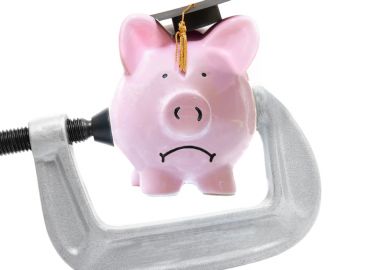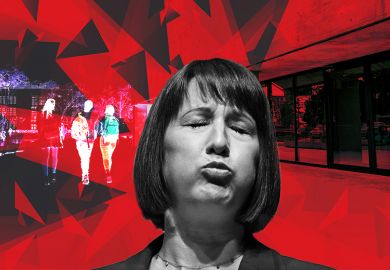Far from apologising for raising the tuition fee cap, ministers should “talk up the benefits” of England’s university funding system, according to a policy expert.
Despite institutions facing a mounting financial crisis, Higher Education Policy Institute (Hepi) director Nick Hillman was due to argue that the system of students paying tuition fees via income contingent loans was “not broken” but just needed to catch up with inflation.
In a speech to a symposium on sector funding hosted by Hepi and the Council for the Defence of British Universities on 16 January, Hillman was expected to say that increasing the tuition fee cap to £9,000 in 2012 had worked “beautifully well”, boosting funding per student while allowing the Treasury to wind down teaching grants.
But, while acknowledging that it was an error to think that part-time and mature students would not be put off enrolling in higher education by increasing fees, Hillman was due to note that a more fundamental issue was that, once prices did go up to £9,000, they did not rise each year in line with inflation, as they had done after fees were increased to £3,000 in 2006.
According to an advance copy of Hillman’s speech, seen by Times Higher Education, once it became clear that fees would bunch up around the £9,000 maximum rather than be spread out more evenly, “the Treasury came to be so worried about the financial exposure from student loans that the idea of annual fee rises went out of the window”. Hillman was a special adviser to David Willetts, then the universities minister, at the time.
And, while universities that passed the Teaching Excellence Framework were allowed to increase their fees to £9,250 in 2017, university opposition to the methodology of the assessment meant that vice-chancellors passed on the chance to “set a precedent [for further fee rises] at a time when inflation was low, leaving them highly exposed when inflation rose significantly later on”, Hillman continued, referring to complaints from Jo Johnson, who was the universities minister at that point.
Fee rises now have to be approved by both Houses of Parliament, and it was not until the election of the Labour government earlier this year that there was political appetite to increase fees again, to £9,535 from this autumn onwards.
Hillman was due to say that this new money was not “anywhere like enough”, with all the additional revenue and more being “snaffled back” in national insurance rises, and that long-term planning remained “very hard” because it was not clear whether this was “a one-off rise or the start of annual rises”.
Hillman was expected to argue for an annual rise in the fee cap of “something like” the retail price index of inflation, plus 2 per cent.
“I would make it clear that this is a long-term commitment for the length of this parliament or even the next decade,” Hillman was due to say.
“I would do this because the system we have is not broken; it has just become out-of-kilter with reality thanks to a refusal to recognise what every schoolkid knows: money changes value over time. In other words, the system we have is clogged up rather than broken.”
Hillman was expected to say that the current funding crisis risked serious damage to the student experience, but that the answer was not another review of the sector, since “every official review we have had in recent decades has recommended something like the funding model we have. What we need is for the system to be recalibrated so that institutions and students have the resources they need to thrive and meet their potential.”
He was due to conclude: “If the government accept my basic line of argument that the current system is not broken, and that it just needs a polish, then ministers should get behind it. At the moment we are in a very odd place where the government is brave enough to increase the fees a little but to do so only in an apologetic way as if it doesn’t really like the student funding model it has been lumbered with…When raising fees, [education secretary] Bridget Phillipson told the House of Commons time and time again that it was a difficult decision.
“That is nonsense. Ministers have tried to make the blindingly obvious policy decision of raising fees in line with inflation look like it is much more difficult than it really is. But if they are going to stick with the model we have…then they would be better to focus on the system’s strengths and to talk up the benefits to prospective students, their parents and the whole world.
“Otherwise, if you will let me end with an analogy with the 2016 Brexit referendum, they will pull the rug from under themselves in exactly the same way as the Remain campaign sowed the seeds of its own defeat when its main players looked embarrassed rather than proud of the status quo that they were defending.”
Register to continue
Why register?
- Registration is free and only takes a moment
- Once registered, you can read 3 articles a month
- Sign up for our newsletter
Subscribe
Or subscribe for unlimited access to:
- Unlimited access to news, views, insights & reviews
- Digital editions
- Digital access to THE’s university and college rankings analysis
Already registered or a current subscriber?








